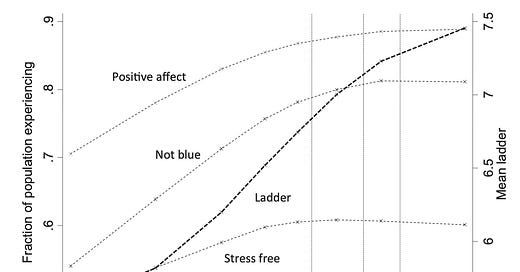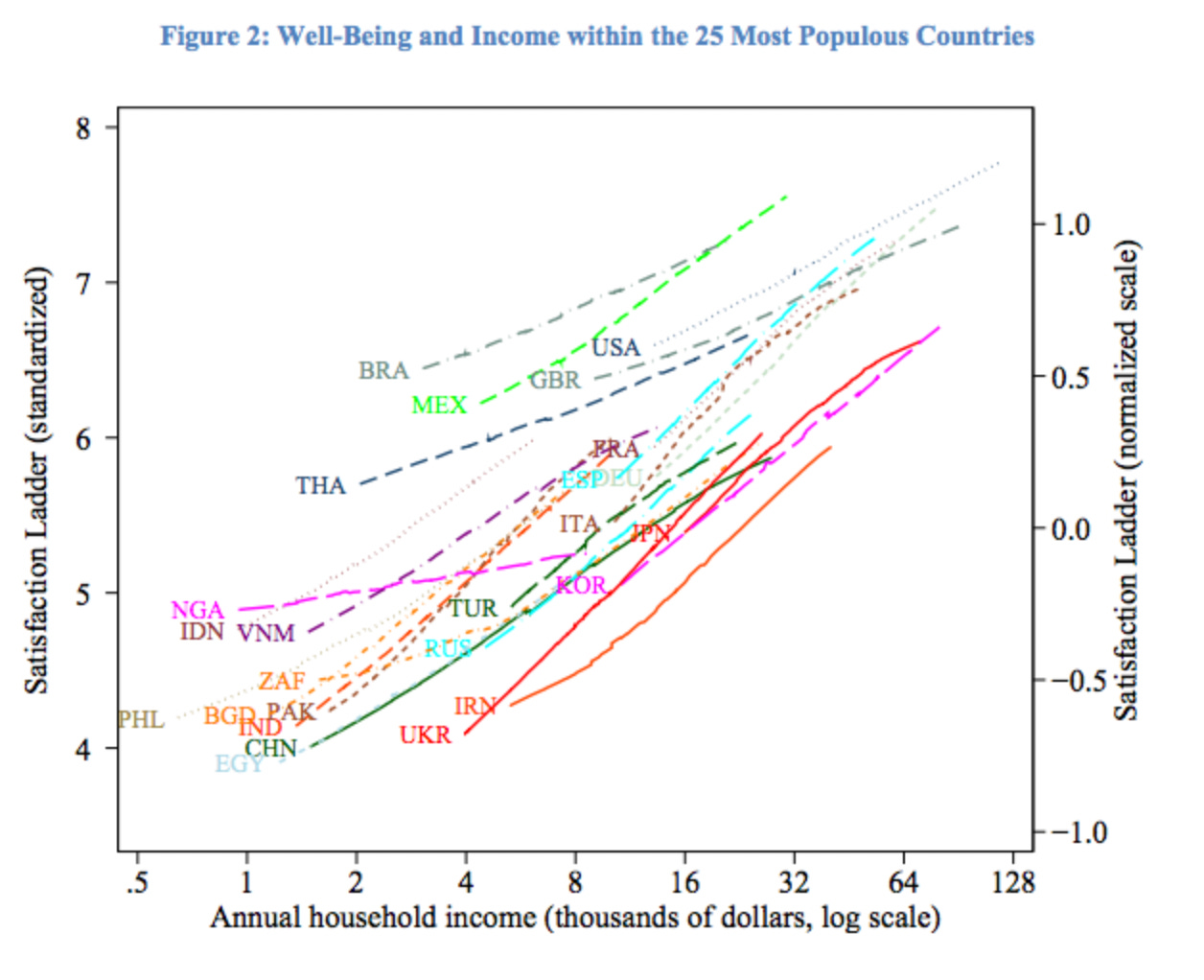The reporting on the relationship between happiness and income is pretty bad. If you Google ‘happiness + income’, you’ll find a ton of results about a 2010 study from Princeton University, suggesting that income and happiness are correlated until a person earns about $75,000, at which point the relationship falls apart. Here’s a quote from a TIME article reporting on the study:
People say money doesn't buy happiness. Except, according to a new study from Princeton University's Woodrow Wilson School, it sort of does up to about $75,000 a year. The lower a person's annual income falls below that benchmark, the unhappier he or she feels. But no matter how much more than $75,000 people make, they don't report any greater degree of happiness.
You can find similar reports all over the place, here’s one from Gallup, here’s one in the Guardian, and here’s one in the Wall Street Journal. So, what does the study actually say? The important thing to note is that the study from Kahneman and Deaton is thinking about the relationship between income and two different aspects of happiness - emotional well-being and life evaluation. The measure of a person’s emotional well-being is simply asking them what emotions they felt yesterday (joy, affection, sadness, stress, anxiety, etc.), whereas life evaluation refers to someone’s answer to the question ‘how satisfied are you with your life as a whole these days?’, with respondents rating their lives between 0 (the worst possible life) and 10 (the best possible life). Their result is that emotional well-being is correlated with log income up to $75,000 but not beyond that, whereas life evaluation is correlated with log income even after $75,000.
The study first received the sort of credulous coverage shown above, reporting only on the emotional well-being result without reporting on the life evaluation (or, if mentioning the life evaluation aspect of the study, doing so under a headline only highlighting the emotional well-being result), and then was subject to a backlash that was almost as crude as the original reporting. Here’s an article from Vox that makes the following claim:
I think it's fair to say that this metric — life satisfaction — is a better gauge for what people actually want for themselves than emotional well-being is. I don't want to be perpetually giddy and worry-free; I do want to have a life that I'm, on the whole, happy with.
Well, I don’t think this is fair to say at all. I think this is case of contrarian brain - Dylan Matthews saw that all the other reports were implying that emotional well-being was the thing that really mattered, so decided to argue that actually life satisfaction is the one that really matters. But I’m not sure that this is the case at all - reporting feeling lots of joy and fascination and minimal stress and anxiety in my life seem just as important as my overall rating of my life satisfaction. A worry I have here is that people will use their income as a metric for how satisfied with their life even if it doesn’t affect how happy they actually are - if someone asked me how satisfied I was with how my life was going, I might think about the question and reason ‘well, I earn a decent amount of money, I have a pretty good education, so I guess my life is going pretty well’. Interestingly, the study found that education was correlated with life satisfaction, but health and loneliness were much better predictors of day-to-day emotional well-being. In fact, the income-normalised correlation between being a graduate and having a positive emotional affect is only 0.03 (with the correlation between log income and positive affect being 1), whereas the correlation between having a health condition and positive affect is -4.45, and the correlation between being lonely and positive affect is -7.13.
There are a few more things I want to point out about these studies: firstly, I’m not convinced that causal inference is possible here. Yes, it seems like log income is correlated with life satisfaction even when controlling for lots of covariates, but omitted variable bias is still a problem with these correlational studies and confounders are likely to exist (obvious example would be something like trait conscientiousness - where there is at least some evidence that it is correlated with both happiness and income) as well as a possible reverse causation problem (maybe happier people make more money?). I know it intuitively seems like income should have a causal effect on happiness, but confounders are always an issue and I don’t think we should take for granted that a correlation is clear evidence of a causal effect.
The other thing that concerns me slightly is the use of log income rather than income as the independent variable. The thinking here, which is fairly rational, is that $100 is going to mean much less to someone earning $100k than it will to someone earning $20k, so we can’t just use income as the independent variable. If you look at the above chart which uses a linear scale, you can see that it is the case that self-reported happiness level will continue to increase somewhat with income, but it only looks particularly impressive when you use a log scale. I don’t have any real objection to using a log scale, but I think when people look at the one below, they might come away with a mistaken impression about the relationship between income and happiness.
The result of the 2010 study is pretty interesting - it shows that emotional well-being is correlated with happiness up to $75,000, whereas life evaluation continues beyond $75k. I think the coverage claiming that either emotional well-being or life evaluation is obviously the better measurement of happiness is a little silly, and I also think that it isn’t clear that we can make any causal claims here. I haven’t spent much time around the literature on happiness research, and it seems pretty interesting, so send me some studies or articles on it if you know about any good ones! Feel free to email or message me on Twitter.







What's the $75k look as purchasing power parity? 75k is probably great income in Nowhere, Oklahoma, but not so good in NYC
Is this pre-tax or post-tax, just wondering